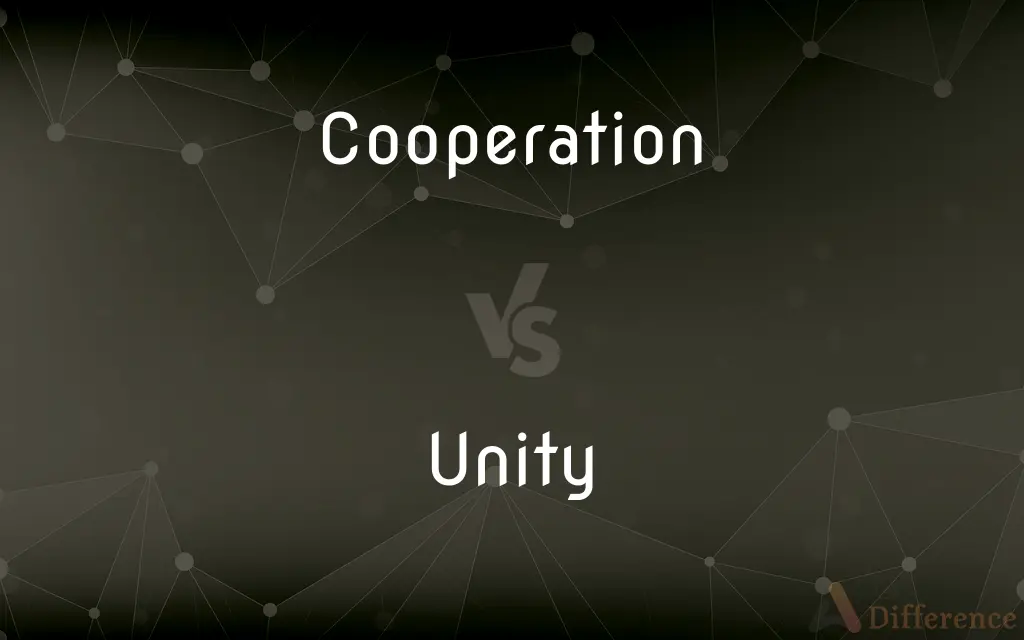Cooperation vs. Unity — What's the Difference?
By Tayyaba Rehman — Updated on September 18, 2023
Cooperation is the act of working together towards a common goal, while unity refers to being undivided or forming a whole.

Difference Between Cooperation and Unity
Table of Contents
ADVERTISEMENT
Key Differences
Cooperation and unity both highlight aspects of collaboration, but they diverge in emphasis. Cooperation underscores the actual process of working in tandem, which may be temporary or goal-specific. Unity, conversely, speaks to a consistent and harmonious alignment, often rooted in shared beliefs or purposes.
It's possible to have cooperation without unity. For instance, competing businesses might cooperate on certain projects, but this doesn't necessarily imply unity in all their endeavors. On the other hand, unity often, but not always, leads to cooperation since a united group tends to work together.
Another distinction lies in the scope of these terms. Cooperation can exist in isolated incidents, perhaps as simple as two people coordinating to lift a heavy object. Unity, however, suggests a broader, more enduring harmony, potentially encompassing beliefs, values, or objectives.
A community may show unity in its shared values and identity, which subsequently fosters a spirit of cooperation among its members. Still, it's vital to recognize that unity is more about the state of being one or the condition of harmony, while cooperation is the act of working together.
In summary, while both cooperation and unity revolve around joint efforts and harmony, cooperation is more about the action and process, and unity is about the underlying state of oneness or accord.
ADVERTISEMENT
Comparison Chart
Primary Meaning
Working together towards a goal
Being undivided or forming a whole
Duration
Can be temporary
Suggests a more enduring state
Scope
Specific acts or projects
Broader alignment or harmony
Presence in Groups
Can exist without deep-seated alignment
Implies deep-seated alignment
Outcome
Joint action
Harmonious state or condition
Compare with Definitions
Cooperation
Joint action towards a shared goal.
International cooperation is vital for addressing climate change.
Unity
The state of being one.
The unity of the team was evident in their celebrations.
Cooperation
Harmonious collaboration between parties.
Cooperation between teams led to a faster solution.
Unity
A consistent or uniform quality.
The design had a sense of unity and flow.
Cooperation
Voluntary assistance or contribution.
The police asked for the public's cooperation in finding the suspect.
Unity
Being in agreement or concord.
The council made decisions with unity, despite their differences.
Cooperation
Partnership in a task or mission.
Cooperation between agencies can optimize resources.
Unity
A condition of harmony.
The nation found unity in the face of adversity.
Cooperation
Working together for mutual benefit.
Their cooperation ensured the project's success.
Unity
The state or quality of being one or united into a whole
"The Founding Fathers had abhorred the concept of parties, fearing that they would undermine the unity of the nation through factionalism" (Julian E. Zelizer).
Cooperation
The act or practice of cooperating.
Unity
The state or quality of being in accord; harmony
The judges ruled in unity on the matter.
Cooperation
Cooperation (written as co-operation in British English) is the process of groups of organisms working or acting together for common, mutual, or some underlying benefit, as opposed to working in competition for selfish benefit. Many animal and plant species cooperate both with other members of their own species and with members of other species (symbiosis or mutualism).
Unity
The state or quality of being unified in an aesthetic whole, as in a work of literature
The novel's thematic unity.
Cooperation
The association of persons or businesses for common, usually economic, benefit.
Unity
A whole that is a combination of parts
A group of ideas that taken together constitute a unity.
Cooperation
The act of cooperating.
Unity
Singleness or constancy of purpose or action; continuity
"In an army you need unity of purpose" (Emmeline Pankhurst).
Cooperation
Active help from a person, organization, etc., such as an orderly sharing of space or resources.
Unity
One of the three principles of dramatic structure derived by French neoclassicists from Aristotle's Poetics, stating that a drama should have but one plot, which should take place in a single day and be confined to a single locale.
Cooperation
Association for mutual benefit, such as for purposes of production or purchase.
Unity
The number 1.
Cooperation
The act of coöperating, or of operating together to one end; joint operation; concurrent effort or labor.
Not holpen by the coöperation of angels.
Unity
See identity element.
Cooperation
The association of a number of persons for their benefit.
Unity
(uncountable) Oneness; the state or fact of being one undivided entity.
Cooperation
Joint operation or action;
Their cooperation with us was essential for the success of our mission
Unity
Agreement; harmony.
Cooperation
The practice of cooperating;
Economic cooperation
They agreed on a policy of cooperation
Unity
A single undivided thing, seen as complete in itself.
Unity
(drama) Any of the three classical rules of drama: unity of action (nothing should be admitted not directly relevant to the development of the plot), unity of place (the scenes should be set in the same place), and unity of time (all the events should be such as might happen within a single day).
Unity
(mathematics) The number 1 or any element of a set or field that behaves under a given operation as the number 1 behaves under multiplication.
The cube roots of unity
Unity
(legal) The peculiar characteristics of an estate held by several in joint tenancy.
Unity
(Quakerism) The form of consensus in a Quaker meeting for business which signals that a decision has been reached. In order to achieve unity, everyone who does not agree with the decision must explicitly stand aside, possibly being recorded in the minutes as doing so.
Unity
The state of being one; oneness.
Whatever we can consider as one thing suggests to the understanding the idea of unity.
Unity
Concord; harmony; conjunction; agreement; uniformity; as, a unity of proofs; unity of doctrine.
Behold, how good and how pleasant it is for brethren to dwell together in unity!
Unity
Any definite quantity, or aggregate of quantities or magnitudes taken as one, or for which 1 is made to stand in calculation; thus, in a table of natural sines, the radius of the circle is regarded as unity.
Unity
In dramatic composition, one of the principles by which a uniform tenor of story and propriety of representation are preserved; conformity in a composition to these; in oratory, discourse, etc., the due subordination and reference of every part to the development of the leading idea or the eastablishment of the main proposition.
Unity
Such a combination of parts as to constitute a whole, or a kind of symmetry of style and character.
Unity
The peculiar characteristics of an estate held by several in joint tenancy.
Unity
An unreduced or unbroken completeness or totality
Unity
The smallest whole number or a numeral representing this number;
He has the one but will need a two and three to go with it
They had lunch at one
Unity
The quality of being united into one
Unity
Wholeness or undividedness.
The artwork represented the unity of nature and man.
Common Curiosities
Can there be unity without cooperation?
Yes, unity can exist without active collaboration or cooperation.
Does unity mean complete agreement?
No, unity means harmony or alignment, not necessarily unanimous agreement.
Is unity more emotional or logical?
Unity can be both emotional, like shared feelings, and logical, like shared goals.
Is cooperation always voluntary?
Not always; sometimes cooperation is mandated or coerced.
Can competitors exhibit cooperation?
Yes, competitors can cooperate in specific areas while competing in others.
Does cooperation always result in success?
No, cooperation doesn't guarantee success but often enhances the chances.
Is cooperation solely a human trait?
No, many animal species also exhibit forms of cooperation.
Does cooperation mean equal contribution?
No, parties can cooperate but contribute differently based on capacity or role.
Is cooperation always a two-way street?
Generally, cooperation involves mutual collaboration, but the extent may vary.
Can unity exist in diversity?
Yes, "unity in diversity" means harmonious coexistence despite differences.
Can unity be temporary?
While unity often suggests a lasting state, it can be momentary in some contexts.
What breaks unity in a group?
Discord, disagreements, or lack of shared purpose can disrupt unity.
Does unity mean sameness?
No, unity can exist amid diversity without complete uniformity.
Can unity be achieved through dialogue?
Yes, dialogue often promotes understanding and fosters unity.
Is forced cooperation genuine?
Forced cooperation might lack the spirit of true voluntary collaboration.
Share Your Discovery

Previous Comparison
Sulphide vs. Sulfide
Next Comparison
Machine vs. ApplianceAuthor Spotlight
Written by
Tayyaba RehmanTayyaba Rehman is a distinguished writer, currently serving as a primary contributor to askdifference.com. As a researcher in semantics and etymology, Tayyaba's passion for the complexity of languages and their distinctions has found a perfect home on the platform. Tayyaba delves into the intricacies of language, distinguishing between commonly confused words and phrases, thereby providing clarity for readers worldwide.















































